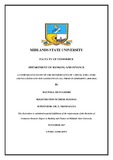Please use this identifier to cite or link to this item:
https://cris.library.msu.ac.zw//handle/11408/3933Full metadata record
| DC Field | Value | Language |
|---|---|---|
| dc.contributor.author | Musvamhiri, Maxwell | - |
| dc.date.accessioned | 2020-12-03T11:45:15Z | - |
| dc.date.available | 2020-12-03T11:45:15Z | - |
| dc.date.issued | 2017-11 | - |
| dc.identifier.uri | http://hdl.handle.net/11408/3933 | - |
| dc.description.abstract | The study sought to compare the determinants of capital structure among listed and non-listed financial firms in Zimbabwe for the period 2010 to 2016. The major objective was to establish if there was a relationship between debt to equity ratio and the independent variables and to answer the question of whether listed financial firms had capital advantages over non-listed financial firms. No studies had been done in Zimbabwe on comparability of listed and non-listed financial firms. Empirical studies done on the determinants of capital structure of banks in Africa used profitability, tangibility, size, growth and non-debt tax shields as firm specific variables and these were found to be the major determinants of capital structure for banks. These variables were also in line with theoretical literature namely Static trade of theory, Pecking order theorem and Agency costs theory. The study adapted a linear Ordinary Least Squares (OLS) model which was used for estimation in Stata 13. Diagnostic tests such as normality, heteroscedasticity, multicollinearity and model specification were run before model estimation. The results showed that out of seven variable 6 variables (profitability, tangibility, size, growth, liquidity and tax shields) were statistically significant factors that determine capital structure for listed financial firms and 5 variables (profitability, tangibility, growth, liquidity and non-debt tax shields) are statistically significant factors that determine capital structure for listed financial firms. Profitability and size for listed and non-listed banks had positive coefficient signs; and tangibility had a negative sign for both listed and non-listed banks, however size results for non-listed banks was statistically not significant. The results also concluded to suggest that listed firms had some advantage over non-listed firms in determining capital structure. The study recommends Zimbabwean banks to use debt capital since the results show that their appetite to borrow increases as they get more profitable. | en_US |
| dc.language.iso | en | en_US |
| dc.publisher | Midlands State University | en_US |
| dc.subject | capital structure | en_US |
| dc.subject | listed and non-listed financial firms | en_US |
| dc.title | A comparative study of the determinants of Capital Structure among listed and non-listed financial firms in Zimbabwe (2010-2016) | en_US |
| dc.type | Thesis | en_US |
| item.fulltext | With Fulltext | - |
| item.openairetype | Thesis | - |
| item.cerifentitytype | Publications | - |
| item.grantfulltext | open | - |
| item.openairecristype | http://purl.org/coar/resource_type/c_18cf | - |
| item.languageiso639-1 | en | - |
| Appears in Collections: | Bachelor Of Commerce Banking And Finance Honours Degree | |
Files in This Item:
| File | Description | Size | Format | |
|---|---|---|---|---|
| MUSVAMHIRI MAXWELL FINAL.pdf | Full Text | 1.12 MB | Adobe PDF |  View/Open |
Page view(s)
214
checked on Apr 4, 2025
Download(s)
196
checked on Apr 4, 2025
Google ScholarTM
Check
Items in MSUIR are protected by copyright, with all rights reserved, unless otherwise indicated.



